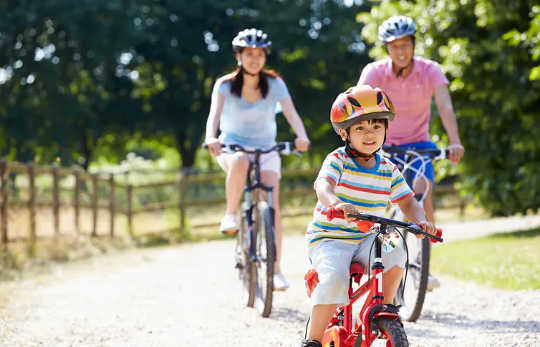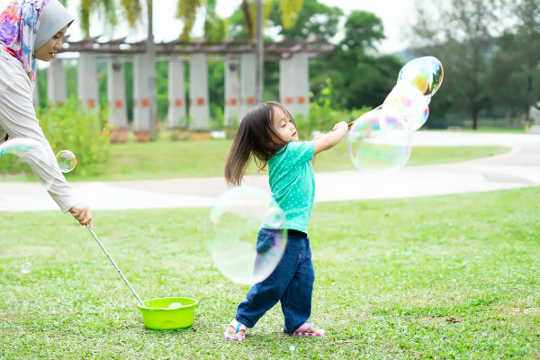 Both when planning family activities and choosing a child care provider, parents should be mindful of how much physical activity their children are getting. (Shutterstock)
Both when planning family activities and choosing a child care provider, parents should be mindful of how much physical activity their children are getting. (Shutterstock)
In the current pandemic many parents of young children are finding themselves spending more time in the role of caregiver than usual. Keeping young children physically active and miminizing screen time while parents manage work schedules may be a serious challenge.
But even before families became more confined to home due to closures and social distancing, children were not getting enough physical activity. The 2020 ParticipACTION report card report card gives children and youth’s physical activity in Canada a D+. The report says less than one in five children and youth in Canada meet guidelines for sedentary behaviours, physical activity and sleep.
Our research investigates young children’s physical literacy, in their “early years,” from birth to age six.
The International Physical Literacy Association defines physical literacy as “the motivation, confidence, physical competence, knowledge and understanding to value and take responsibility for engagement in physical activities for life.”
Get The Latest By Email
Both when children are at home and when they are in care, parents are encouraged to consider how adults are supporting children’s physical development.

Neural pathways
The importance of early childhood physical literacy development should not be overlooked. The brain connections and neural pathways that are formed before the age of five set the foundations for how the brain will develop throughout life.
This not only applies to the social, emotional and cognitive areas of development (or “domains”) but also the physical. There is strong support for physical activity in the early years, and researchers have reported that time spent in this critical developmental period focusing on physical development through physical activity and active play has many benefits.
Physically, this includes improved co-ordination and higher levels of fitness. Socially, this means improved co-operation and sharing with others. Emotionally, this means better management of emotions and overall behaviour.
Young children who are regularly engaged in physical activities also demonstrate cognitive benefits, including improved attention, problem-solving and persistence in tasks.
Research has shown that providing physical activity and active play in the early years positively relates with motor skill ability, fitness levels and physical activity in adolescence and beyond. All these have positive relationships to overall health and wellness.
Unprecedented screen time
Young children in Canada are growing up with unprecedented access to digital media and technology, which has led to some concerns among health professionals.
From a young age, children are enticed with bright and colourful screens and sometimes are just as likely to play games on a phone as they are to play with a ball on the floor, test their balance or ride a tricycle. Consequently, in comparison to previous generations, more children today are entering school lacking basic physical skills. In the province of Manitoba, more than a quarter (26.7 per cent) of children in kindergarten in 2018-19 did not meet motor skill expectations for their age.
It’s now more important than ever before that those caring for young children consider opportunities for physical development.
Adults play critical role
Each person’s physical literacy journey will take its own path, but adults play a crucial role in this journey by providing a range of opportunities and modelling an active lifestyle.
Being active as a family is the primary way children will build positive habits for physical activity, particularly before time spent with peers becomes an important factor.
Our previous research measured physical activity levels in children and found, on average, kids walked 3,604 fewer steps on a typical weekend day compared to school days. Because parents have a role in children’s physical activity and children typically spend weekends with parents, finding ways to increase family weekend physical activity is important.
 Being active as a family shapes how children develop habits and confidence in physical activity. (Shutterstock)
Being active as a family shapes how children develop habits and confidence in physical activity. (Shutterstock)
Early childhood education
Some children may also not find adequate physical activity in child care.
One study of a sample of about 400 early learning and child care practitioners found that they saw their key responsibilities as promoting social, emotional, and cognitive development — especially numeracy and literacy. This could suggest that children’s physical development and learning may not always take equal priority for practitioners, although regulatory issues and environments can also influence what happens in early learning and care programs.
Providing early childhood caregivers with physical literacy knowledge is one way to influence more physical literacy development opportunities for children.
One strategy to begin addressing this issue is through education resources such as the Physical Literacy Handbook for Early Childhood Educators. Programs for early childhood caregivers and parents can also help underscore how physical learning, development and engagement is related to other key developmental outcomes.
Movement for Life program
We partnered with the City of Winnipeg Community Services department to create the Movement for Life! program focused on physical literacy development in the early years.
The program, aimed at early childhood caregivers including parents, combines a three-hour educational workshop, a participant handbook and practical sessions facilitated by Fit Kids Healthy Kids.
During these sessions, children participate in activities related to physical literacy, while caregivers observe and learn strategies to facilitate these. The goal of the program is that participants will gain confidence, understanding and competence in providing opportunities in physical literacy for very young children.
Our research, to date, on the Movement for Life! program shows that early childhood caregivers who participate in the program are more confident in their ability to offer physical activities that develop children’s motivation, confidence, competence, knowledge and understanding related to engagement in physical activities.
Don’t need to be Olympians
Parents don’t need to be Olympians to get kids active. Simple games and making the most of opportunities to be active are perfect ways to get young kids and families moving together.
The early years are critical for establishing a strong foundation for human growth in all developmental domains.
Sharing knowledge and strategies, as well as providing enhanced training to those who can most influence physical literacy in young children, is a great place to start.
About The Author
Nathan Hall, Associate Professor, Faculty of Education and Faculty of Kinesiology and Applied Health, University of Winnipeg and Melanie Gregg, Professor of Sport and Exercise Psychology, University of Winnipeg
This article is republished from The Conversation under a Creative Commons license. Read the original article.
books_fitness







